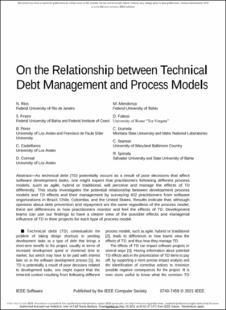Mostrar el registro sencillo del ítem
On the relationship between technical debt management and process models
| dc.contributor.author | Rios, Nicolli | |
| dc.contributor.author | Freire, Savio | |
| dc.contributor.author | Perez, Boris | |
| dc.contributor.author | Castellanos, Camilo | |
| dc.contributor.author | Correal, Dario | |
| dc.contributor.author | Mendonca, Manoel | |
| dc.contributor.author | Falessi, Davide | |
| dc.contributor.author | Izurieta, Clemente | |
| dc.contributor.author | Seaman, Carolyn B. | |
| dc.contributor.author | Oliveira Spinola, Rodrigo | |
| dc.date.accessioned | 2021-11-26T20:11:41Z | |
| dc.date.available | 2021-11-26T20:11:41Z | |
| dc.date.issued | 2021-02-10 | |
| dc.identifier.uri | http://repositorio.ufps.edu.co/handle/ufps/1464 | |
| dc.description.abstract | —As technical debt (TD) potentially occurs as a result of poor decisions that affect software development tasks, one might expect that practitioners following different process models, such as agile, hybrid or traditional, will perceive and manage the effects of TD differently. This study investigates the potential relationship between development process models and TD effects and their management by surveying 432 practitioners from software organizations in Brazil, Chile, Colombia, and the United States. Results indicate that, although opinions about debt prevention and repayment are the same regardless of the process model, there are differences in how practitioners monitor and feel the effects of TD. Development teams can use our findings to have a clearer view of the possible effects and managerial influence of TD in their projects for each type of process model. | eng |
| dc.format.extent | 07 páginas | spa |
| dc.format.mimetype | application/pdf | spa |
| dc.language.iso | eng | spa |
| dc.publisher | IEEE Software | spa |
| dc.relation.ispartof | IEEE Software | |
| dc.rights | © Copyright 2021 IEEE - All rights reserved. Use of this web site signifies your agreement to the terms and conditions. | eng |
| dc.source | https://ieeexplore.ieee.org/abstract/document/9352243 | spa |
| dc.title | On the relationship between technical debt management and process models | eng |
| dc.type | Artículo de revista | spa |
| dcterms.references | 1.C. Seaman and Y. Guo, "Measuring and monitoring technical debt", Adv. Comput., vol. 82, pp. 25-46, 2011, [online] Available: https://doi.org/10.1016/B978-0-12-385512-1.00002-5. | spa |
| dcterms.references | 2.G. Theocharis, M. Kuhrmann, M. J. Münch and P. Diebold, "Is water-scrum-fall reality? On the use of agile and traditional development practices", Proc. 16th Int. Conf. Product-Focused Softw. Process Improvement, pp. 149-166, 2015. | spa |
| dcterms.references | 3.N. Rios, R. O. Spínola, M. Mendonça and C. Seaman, "The practitioners’ point of view on the concept of technical debt and its causes and consequences: A design for a global family of industrial surveys and its first results from Brazil", Empirical Softw. Eng. Empirical Softw. Eng., vol. 25, no. 5, pp. 3216-3287, 2020. | spa |
| dcterms.references | 4.N. Rios, M. G. Mendonça and R. O. Spínola, "A tertiary study on technical debt: Types management strategies research trends and base information for practitioners", Inf. Softw. Technol., vol. 102, pp. 117-145, Oct. 2018. | spa |
| dcterms.references | 5.Z. Li, P. Avgeriou and P. Liang, "A systematic mapping study on technical debt and its management", J. Syst. Softw., vol. 101, pp. 193-220, Mar. 2015. | spa |
| dcterms.references | 6.T. Besker, A. Martini and J. Bosch, "Managing architectural technical debt: A unified model and systematic literature review", J. Syst. Softw., vol. 135, pp. 1-16, Jan. 2018. | spa |
| dcterms.references | 7.T. Besker, H. Ghanbari, A. Martini and J. Bosch, "The influence of Technical Debt on software developer morale", J. Syst. Softw., vol. 167, pp. 110,586, Sept. 2020. | spa |
| dcterms.references | 8.P. Devanbu, T. Zimmermann and C. Bird, "Belief & evidence in empirical software engineering", Proc. 38th Int. Conf. Softw. Eng. (ICSE), pp. 108-119, 2016. | spa |
| dcterms.references | 9.S. McConnell, Technical debt” 10x Software Development Blog, 2008, [online] Available: https://www.construx.com/resources/whitepaper-managing-technical-debt/. | spa |
| dcterms.references | 10.W. Webber, A. Moffat and J. Zobel, "A similarity measure for indefinite rankings", ACM Trans. Off. Int. Syst., vol. 28, no. 4, 2010. | spa |
| dcterms.references | 11.N. Rios, R. O. Spínola, M. Mendonça and C. Seaman, "Supporting analysis of technical debt causes and effects with cross-company probabilistic cause-effect diagrams", Proc. 2nd Int. Conf. Tech. Debt, pp. 3-12, 2019. | spa |
| dcterms.references | 12.S. Freire et al., "Surveying software practitioners on technical debt payment practices and reasons for not paying off debt items", Proc. Eval. Assessment Softw. Eng., pp. 210-219, 2020. | spa |
| dc.identifier.doi | https://doi.org/10.1109/MS.2021.3058652 | |
| dc.publisher.place | Estados Unidos | spa |
| dc.relation.citationedition | Vol.38 No.5.(2021) | spa |
| dc.relation.citationendpage | 7 | spa |
| dc.relation.citationissue | 5(2021) | spa |
| dc.relation.citationstartpage | 1 | spa |
| dc.relation.citationvolume | 38 | spa |
| dc.relation.cites | Rios, N., Freire, S., Pérez, B., Castellanos, C., Correal, D., Mendonca, M., ... & Spinola, R. O. (2021). On the Relationship Between Technical Debt Management and Process Models. IEEE Software. | |
| dc.relation.ispartofjournal | IEEE Software | spa |
| dc.rights.accessrights | info:eu-repo/semantics/openAccess | spa |
| dc.rights.creativecommons | Atribución 4.0 Internacional (CC BY 4.0) | spa |
| dc.subject.proposal | technical debt | eng |
| dc.subject.proposal | effects of technical debt | eng |
| dc.subject.proposal | technical debt management | eng |
| dc.subject.proposal | process models | eng |
| dc.type.coar | http://purl.org/coar/resource_type/c_6501 | spa |
| dc.type.content | Text | spa |
| dc.type.driver | info:eu-repo/semantics/article | spa |
| dc.type.redcol | http://purl.org/redcol/resource_type/ART | spa |
| oaire.accessrights | http://purl.org/coar/access_right/c_abf2 | spa |
| oaire.version | http://purl.org/coar/version/c_970fb48d4fbd8a85 | spa |
| dc.type.version | info:eu-repo/semantics/publishedVersion | spa |










